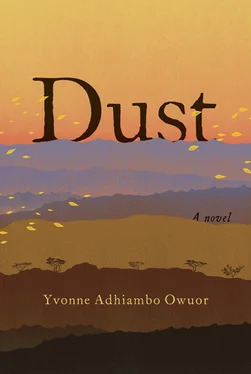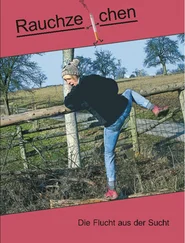Other vitu vishenzi: mosquitoes and tsetse flies. Watu washenzi . Nairobi headquarters. Mau Mau. Colonial District Officers. Men who walked naked. Adorned women who hunted like men. Oftentimes, Nyipir’s ancestors, the Kenya Colony government, the Suez Crisis, and the Northern Frontier District were afflicted with afya na roho kishenzi .
Nyipir limps to the falling gate, standing on the boundaries between here and there. Why hadn’t he gone yet to either Burma or the Nile?
Ajany sketches Nyipir’s restlessness.
“Wuoth Ogik?” Ajany’s voice follows Nyipir.
Nyipir shakes himself alert.
“Many, many days later, we made camp near a large termite mound in a corner of the Koroli springs.”
Memory of ruffling winds, doum palms simulating ocean waves. A prismlike dawn and the chirping of assorted birds. A male oryx beside Hugh and Nyipir, more curious than afraid: a pale-gray compact body, clipped mane, and horse’s tail, black-and-white clown-mask face.
Nyipir explains that Hugh had drawn the plans for a house in the dust, his fingers scraping the ground until they bled.
“Akai-ma?” Ajany asks.
“Wait.” Nyipir suddenly smiles. “She’s on her way.”
Almost fifty years ago, an ebony-hued woman, as slender as the leaves of the mwangati tree, whose long, long neck was adorned with wire coils lifted off of telegraph cables, shimmered into view from across a brackish oasis. When she had waved long arms at Nyipir, who was leaning against a tree guarding Hugh, he was sure he had fallen asleep and was experiencing a revelation. When she hailed him in a low, laughing voice, Nyipir had known who she would be to him.
But Akai’s gaze had moved to Hugh. Her head tilted at the sight of the pale, wiry, naked man scooping black mud and rubbing it into his face. She had stooped to laugh, holding on to her sides, and the sound had exploded light into the existence of two different men who had been lonely in their own ways until then.
Two horses and three small-bodied Rendille camels watched, their noses half in and half out of water. Akai’s laughter invited everything to play. Nyipir waved her away, urged her to run off, certain he would follow her. Hugh, in the watering hole, huffed when he saw her.
Akai preempted Hugh’s snarl. “What’s your name, mister?” Guffawing, she pointed at his mud-encrusted face.
Hugh had straightened up from the water hole, hand in front of his balls, swiveled his head to locate Nyipir, and bellowed, “Kijana, wapi ule mtu kishenzi? Lete hile towel haraka!” Fetch a towel at once, boy!
Nyipir was underwater, suffocating because meaning had all of a sudden condensed into the girl in front of them. Cat-eyed sparkle, thin arms reaching toward the wrong man. Hugh gasped when the girl kicked off her shoes. Nyipir knew what would happen next, and he howled at Akai, flapping his arms to prevent it. “Go! Go! Tokaaa! ” To Hugh, a command, “We go now, bwana . This is not good.”
Hugh heard Nyipir. Knew his fear, and knowledge became malice.
Nyipir had prayed as Akai jumped into the watering hole and splashed muddy water onto Hugh’s face. He grunted when Hugh reached forward to drag the girl to himself.
Akai came to stay. Five months later, the frame of Hugh’s new house was ready. Breakfast at the site, close to the fraying tents. Nyipir had been standing behind Hugh, who was sipping black Ceylon tea.
Hugh had asked, “Kijana, utatumia neno gani kwa lugha yako kuhusu nyumba mpya? Neno sio kishenzi.” What word can be used to name this home? Something civilized.
Nyipir, weary of the three and a half years of seeking, recording, decamping, traveling, and plotting new journeys said, “Wuoth Ogik?” He was being sarcastic.
“Na maana yake ni nini, kijana, ongeza chai?” What does it mean, boy, more tea?
“The journey ends.” Nyipir had tilted the teapot into the proffered cup.
Hugh slurped the beverage. He rocked in the safari chair. “Damn good. Bleddy good. Write it out, lad, good lad.”
Exactly seven months later, the Kalasinga foreman gave Hugh the hammer that would pound the last nail in a house made of desert stone, coral, crushed obsidian, termite soil, doum palm, rods, acacia trunks, and a sprinkling of cement. Above the door to an inner room with deep-set windows and a curvy roof, a workman etched the bibas in Non draco sit mihi dux / Vade retro satana .… Hugh smirked. “Get thee behind me, Satan.”
Nyipir had asked, “ Bwana , this says what?”
“Live-in exorcism … A joke, lad.”
Nyipir cleared his throat. “When Madam Bolton comes, what happens to …”
Hugh rounded on Nyipir, face red, ginger hair disheveled, and through gritted teeth ground out, “Mtu kishenzi , sweep the veranda, mara moja .”
That was then.
Silence now.
His daughter would never hear about the nightmare of a returned, wet-eyed, frantic, and newly damaged woman with a look of such death that Nyipir, without thought, threw his fate and destiny into her hell, even if it meant his damnation. Which it did. Nyipir fights his way back into the present. Something is stuck in his throat. He hurries away as he clears his throat over and over again. Thinking that, after all this time, he had neither gone to Burma nor visited the Nile.
A GOVERNMENT LAND ROVER LEAPS OVER BLACK ROCKS. A DOLEFUL Galgalu sits next to Petrus, clutching the dashboard and reflecting on life, annoyance, and his companion. He misses the livestock, traveling with them, watching over them while they browsed. He misses the honeyguides that led him to the best honey, the honey he kept for himself. Inundated, Galgalu touches the amethyst.
Petrus says, “Tell me more about yourself.”
Right now Galgalu longs for silence.
Petrus turns. “You’re comfortable?”
Galgalu stares out the window.
Petrus says, “ Eh! This is a big land.”
They drive ten minutes.
Petrus says in Kiswahili, “So — where’s your family?”
Galgalu scowls. “Far.”
“Ehe?” Petrus prompts, chewing on his unlit cigarette.
Galgalu lifts his left tire sandal to pull out pebbles. He leans out the window, clears his sinuses, and blows the mucus from his nose.
Petrus grunts. “Don’t do that in my car.”
Galgalu looks at Petrus’s suit, feels the heat. Maybe God in His kindness will stew Petrus to death . Galgalu smiles.
Midmorning, the car rumbles to a hasty stop, throwing dust and pebbles around. Galgalu’s head hits the window. He turns to ask, What? And sees a man lying on the track. Petrus throws the door open and rushes over to the prone figure, who is holding on to his stomach. The ground around him is soaked. Next to him a murmuring radio offers a BBC World service signal.
A tremor in Galgalu’s tone: “The Trader!”
Petrus squats close to the man. “What’s happened?”
The Trader groans, “Galgaluuu! I dreamed you.”
Galgalu sees what the Trader is holding on to, and blood rushes from his head. Faintness.
The Trader coughs. “Man, could you help put these things away?” His intestines are hanging out.
Soft-voiced, Petrus asks again, “What happened?” He returns to the car to re-emerge with a large, stained beige cloth, which he stretches on the ground. To Galgalu: “You! We lift him, move him into the car.”
Galgalu wipes his mouth.
The Trader mumbles and coughs out phlegm. “The radio …”
Galgalu shuts his eyes. They lift the Trader into the car. Galgalu picks up and wipes the little radio, turns off the dial. Silence.
Galgalu says, “We’re going to the mission.”
Читать дальше











